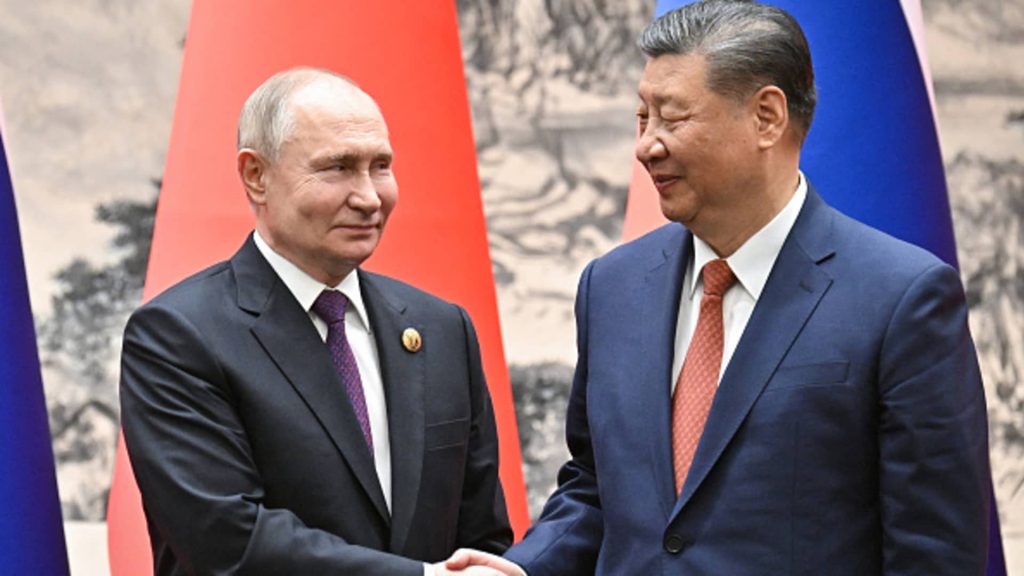Russian President Vladimir Putin (L), Chinese President Xi Jinping (2nd R) and Mongolian President Ukhnagiin Khurelsukh (not seen) get together for a trilateral meeting in Beijing, China on September 2, 2025.
Anadolu | Anadolu | Getty Images
Russia and China on Tuesday signed a legally binding deal to build the long-delayed Power of Siberia 2 gas pipeline, deepening commercial ties in what is likely to be seen as a defiant signal to the West.
Alexei Miller, the chief executive of Russia’s state-owned energy giant Gazprom, told Russian news agencies that a memorandum of understanding had been signed on the construction of the new gas pipeline, following talks between Russian President Vladimir Putin and China’s Xi Jinping in Beijing.
The pipeline, which is set to transit gas reserves in Russia’s West Siberia to northern China via eastern Mongolia, will make it possible to supply 50 billion cubic meters (bcm) of gas per year, Miller said, according to Russia’s Interfax news agency.
Supplies under the new Power of Siberia 2 agreement will run for 30 years.
The price of the gas via the new pipeline will be agreed on separately, Miller said. The two countries also signed a separate agreement for Gazprom to boost gas supplies to China through the existing Power of Siberia pipeline.
A Gazprom spokesperson was not immediately available to comment when contacted by CNBC. Beijing has not yet confirmed Miller’s announcement, although state news agency Xinhua reported that the two countries signed more than 20 cooperation agreements, with energy deals among them.
Russia’s gas exports to Europe have collapsed since Moscow’s full-scale of invasion of Ukraine in early 2022. The West has imposed punitive economic sanctions on the Kremlin and reduced dependency on Russian energy, seeking to cut off a major source of revenues funding Putin’s war machine.
The European Union, for example, introduced measures to stop the import of Russian gas and oil by the end of 2027, while the U.S. imposed a ban on the import of Russian fossil fuels in March 2022.
The measures have injected fresh urgency into Moscow’s years-long push to build the Power of Siberia 2 gas pipeline. As a result, Russia has been trying to pivot to Beijing to replace Europe as its major gas customer.
A new multipolar order
Christopher Granville, managing director at TS Lombard, said that while the significance of the Power of Siberia 2 gas pipeline agreement is “somewhat limited,” it should not be dismissed as a “nothing burger” either.
“For the past decade, Gazprom has been pushing China to give the go-ahead for Power of Siberia-2, only to be met – until now – with positive but non-committal noises. So today’s signing of a MOU is a step forward for Gazprom,” Granville told CNBC by email.
“The fact that this has happened against the background of the fraught Ukraine war endgame, is a clear enough signal of China’s steady strategic backing for Russia as the lynchpin of the new multipolar order to which both these core Eurasian powers aspire,” Granville said.
Russian President Vladimir Putin greets Mongolian President Ukhnaa Khurelsukh prior to a trilateral meeting with Chinese President Xi Jinping (not pictured) at the Great Hall of the People on September 2, 2025 in Beijing, China.
Vcg | Visual China Group | Getty Images
It is a long way, however, from an MOU to a Final Investment Decision. The equivalent MOU-style agreement in principle on the original Power of Siberia pipeline was struck in the mid-2000s, Granville said, noting that a definitive pricing agreement was not agreed until 2014.
Russia and China have sought to showcase a new global security and economic order at the annual Shanghai Cooperation Organization (SCO) summit.
In a thinly veiled swipe at U.S. President Donald Trump’s administration, China’s Xi said in his opening speech on Monday that the world had entered “a new phase of turbulence” with global governance at a “new crossroads.”
‘Trump Always Chickens Out’
Timothy Ash, an associate fellow in the Russia and Eurasia program at Chatham House, said China has been “playing very hard” to get the Power of Siberia 2 gas pipeline deal over the line.
That’s partly because of Russia’s urgency to sign an agreement given the loss of more than 120 bcm in gas exports to Europe, Ash said, and perhaps because Beijing had previously been “mindful of not annoying” the Biden administration by going all out in support of Putin.
U.S. President Donald Trump in the Cabinet Room of the White House on Aug. 26, 2025 in Washington, D.C.
Chip Somodevilla | Getty Images
“But now I think likely the Chinese got a better deal, in terms of the pricing, and perhaps are now more willing to fund the construction,” Ash told CNBC by email.
“I think Xi has figured out TACO and that only by adopting a strong, tough stance towards the US, will the US actually back down,” Ash said. The TACO acronym refers to “Trump Always Chickens Out,” a term to describe the back-and-forth nature of the president’s tariff policies.
“I think this SCO has all been about presenting a United front to the US, that the Global South will not back down in response to US pressure,” he added.

